|
|
|
Sort Order |
|
|
|
Items / Page
|
|
|
|
|
|
|
| Srl | Item |
| 1 |
ID:
122244
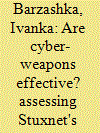

|
|
|
|
|
| Publication |
2013.
|
| Summary/Abstract |
When news of Stuxnet first emerged, many thought that it had caused a major setback to Iran's uranium-enrichment programme. Ivanka Barzashka argues instead that while Stuxnet may have had the potential to seriously damage Iranian centrifuges, evidence of the worm's impact is circumstantial and inconclusive. Her analysis of the related data shows that the 2009 version of Stuxnet was neither very effective nor well-timed and, in hindsight, may have been of net benefit to Tehran.
|
|
|
|
|
|
|
|
|
|
|
|
|
|
|
|
| 2 |
ID:
083100
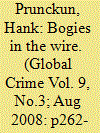

|
|
|
|
|
| Publication |
2008.
|
| Summary/Abstract |
An article that discusses how information and communications technology (computer systems and data transmission) are used as 'cyber weapons' for criminal purposes. It canvasses a number of legislative policy options for controlling their misuse. The paper concludes with the view that implementing some form of cyber weapons laws - in the same vein as firearms legislation - would not only help ensure society's domestic well-being, but would also aid national security.
|
|
|
|
|
|
|
|
|
|
|
|
|
|
|
|
| 3 |
ID:
122351
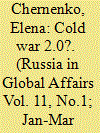

|
|
|
|
|
| Publication |
2013.
|
| Summary/Abstract |
It is very hard - in most cases impossible - to track down the source of a cyber attack. Since the U.S. and Russia have reserved the right to respond to cyber incidents like they were conventional acts of aggression, the two countries must work out confidence-building measures.
|
|
|
|
|
|
|
|
|
|
|
|
|
|
|
|
| 4 |
ID:
113383
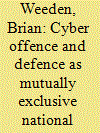

|
|
|
| 5 |
ID:
132291
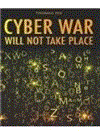

|
|
|
|
|
| Publication |
New Delhi, Pentagon Press, 2013.
|
| Description |
xvi, 218p.Hbk
|
| Standard Number |
9788182747562
|
|
|
|
|
|
|
|
|
|
|
|
Copies: C:1/I:0,R:0,Q:0
Circulation
| Accession# | Call# | Current Location | Status | Policy | Location |
| 057804 | 355.343/RID 057804 | Main | On Shelf | General | |
|
|
|
|
| 6 |
ID:
125439
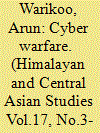

|
|
|
|
|
| Publication |
2013.
|
| Summary/Abstract |
The 21st century is rightly dubbed as an information age. Endless information is readily available made possible by interconnection of billions of computers systems globally over a backbone of networks commonly referred to as the internet the growing reliance on laptops, computer systems, ipads and smart phone to perform most of our tasks has created a parallel world the cyber world.
|
|
|
|
|
|
|
|
|
|
|
|
|
|
|
|
| 7 |
ID:
122032
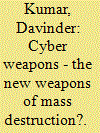

|
|
|
| 8 |
ID:
114385
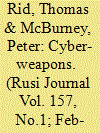

|
|
|
|
|
| Publication |
2012.
|
| Summary/Abstract |
What are cyber-weapons? Instruments of code-borne attack span a wide spectrum, from generic but low-potential tools to specific but high-potential weaponry. This distinction brings into relief a two-pronged hypothesis that stands in stark contrast to some of the received wisdom on cyber-security. Maximising the destructive potential of a cyber-weapon is likely to come with a double effect: it will significantly increase the resources, intelligence and time required for development and deployment - and more destructive potential is likely to decrease the number of targets, the risk of collateral damage and the political utility of cyber-weapons.
|
|
|
|
|
|
|
|
|
|
|
|
|
|
|
|
| 9 |
ID:
129912
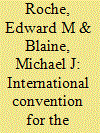

|
|
|
|
|
| Publication |
2014.
|
| Summary/Abstract |
Cyber weapons now are an extension of state power. In hopes of gaining a strategic advantage, many countries including the United States, Russia and China are developing offensive cyber capabilities to disrupt political, economic, and social institutions in competitor nations. These activities have led to a cyber arms race that is spiraling out of control. This imminent global threat challenges the international community to be proactive. The purpose of this article is to propose an international convention to throttle the development, proliferation and use of cyber weapons before they cause electronic Armageddon. We begin by examining three successful efforts in arms control and use the lessons learned to draft a convention that can serve as a starting point for formal multilateral negotiations.
|
|
|
|
|
|
|
|
|
|
|
|
|
|
|
|
| 10 |
ID:
107821
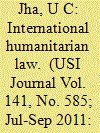

|
|
|
| 11 |
ID:
124371
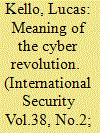

|
|
|
|
|
| Publication |
2013.
|
| Summary/Abstract |
Security policy in the information age faces formidable challenges. Chief among these is to evaluate correctly the impact of cyberweapons on strategy: Does the new technology require
a revolution in how scholars and policymakers think about force and conºict?1 Practitioners confront a predicament in addressing this question: the cyber revolution gives rise to novel threats and opportunities requiring immediate policy responses; yet understanding its nature and its consequences for security is a slow learning process. Interpretation of cyber phenomena involves analysis of a new body of experience that existing theories may be unable to clarify. It presupposes, moreover, a technical understanding of a transforming technology, whose implications require time to master because of its scientific complexity.
|
|
|
|
|
|
|
|
|
|
|
|
|
|
|
|
| 12 |
ID:
192046
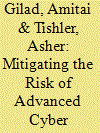

|
|
|
|
|
| Summary/Abstract |
Modern countries employ computer networks that manage organizations in the private and public sectors. Cyber-attacks aim to disrupt, block, delete, manipulate or steal the data held in these networks, which challenge these countries’ national security. Consequently, cybersecurity programs must be developed to protect these networks from cyber-attacks in a manner that is similar to operations against terrorism. This study presents several models that analyze a contest between a network operator (defender) that deploys costly detectors to protect the network and a capable cyber attacker. Generally, when the deployed detectors become more potent or the defender exhibits higher vigilance, the attacker allocates more resources to R&D to ensure that the attack remains covert. We show that detectors may be substitutes, complements, or even degrade each other, implying that defenders must account for the cyber weapons’ characteristics and the attacker’s profile and strategic behavior. We derive the optimal number of detectors when the attacker’s R&D process features R&D spillovers and show that targeted detectors act as deterrents against high-quality weapons only if the attacker’s budget is not substantial. Finally, we demonstrate that common cybersecurity practices may be detrimental from a social-welfare perspective by enhancing an arms race with the attacker.
|
|
|
|
|
|
|
|
|
|
|
|
|
|
|
|
| 13 |
ID:
162806
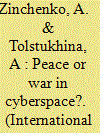

|
|
|
|
|
| Summary/Abstract |
INFORMATION and communication technology (ICT) plays an unprecedented role in today's world, but cyberspace is clearly lacking in security mechanisms that can guarantee stable and sustained world development.
|
|
|
|
|
|
|
|
|
|
|
|
|
|
|
|
| 14 |
ID:
166611
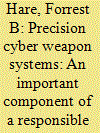

|
|
|
|
|
| Summary/Abstract |
Given the advances made in conventional weapon capabilities, precision should by now be the accepted and expected norm in cyberspace as well. In this article I argue that developing precision cyber weapon systems, to be used during a lawful conflict, can be an important part of a responsible national security strategy to reduce the amount of violence and physical destruction in conflicts. I first describe a precision cyber weapon system in a military context. I then present three compelling rationales for the development of precision cyber weapon systems based on ethical, operational, and financial considerations. To support the position, I address several arguments that have been levied against their development. Thereafter I present several recommendations for a way ahead.
|
|
|
|
|
|
|
|
|
|
|
|
|
|
|
|
| 15 |
ID:
147777
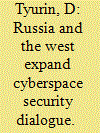

|
|
|
|
|
| Summary/Abstract |
This year's forum was attended by representatives from Russia, the United States, China, the UK, Korea, Germany, Finland, Italy, Switzerland, Canada and other countries. The Russian delegation was led by Col. Gen. Vladislav Sherstyuk, former chief of the Federal Government Communications and Information Agency (FAPSI) and advisor to the secretary of the Russian Security Council. Opening the forum, he said that the global community today is on the threshold of a real threat, specifically the malicious and hostile use of information and communication technology (ICT). The war in cyberspace and cyber terrorism can lead to accidents at nuclear power plants, the destruction of hydroelectric power plants, accidents in the transport sector and other infrastructure facilities, with destructive consequences on par with those caused by weapons of mass destruction. "As the security of entire humankind is at stake, this problem can only be solved through joint efforts," V. Sherstyuk said.
|
|
|
|
|
|
|
|
|
|
|
|
|
|
|
|
| 16 |
ID:
114033
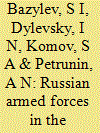

|
|
|
|
|
| Publication |
2012.
|
| Summary/Abstract |
The authors draw on the record of modern-day armed conflicts and practices followed in operational training of troops and staffs to come up with a system of principles and rules guiding the Russian Armed Forces' behavior in cyberspace operations and confidence-building measures that, they believe, could maximize the opportunities offered by the global information environment for reinforcing the country's defense capabilities, containing and preventing military conflicts, promoting cooperation in the military field, and developing an international information security system.
|
|
|
|
|
|
|
|
|
|
|
|
|
|
|
|
| 17 |
ID:
165627
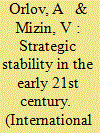

|
|
|
|
|
| Summary/Abstract |
ONE HUNDRED YEARS AGO, mankind entered the 20th century as the "golden age" of realized ideals of freedom and humanism. Reality proved to be different: this was the cruelest and the bloodiest period in the history of modern civilization.
|
|
|
|
|
|
|
|
|
|
|
|
|
|
|
|
| 18 |
ID:
141951
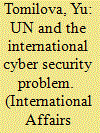

|
|
|
|
|
| Summary/Abstract |
THE INTERNATIONAL CYBER SECURITY problem has long been one of the top items on international agendas, largely because of the rapidly growing effects of information technology (IT) on global social and political affairs. IT is not just becoming a means of raising living standards and overcoming social inequalities but is increasingly seen both by state and non-state actors as a strategic resource, a means of attaining political, military and other goals.
|
|
|
|
|
|
|
|
|
|
|
|
|
|
|
|
| 19 |
ID:
126746
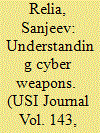

|
|
|
| 20 |
ID:
184558
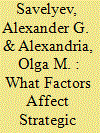

|
|
|
|
|
| Summary/Abstract |
The article analyzes the data obtained in a survey that involved twenty
leading Russian experts specializing in international security, arms control,and strategic stability. The survey was conducted in December 2021. The
respondents were asked to name factors that, in their opinion, currently have
(2022) or will have a tangible impact on strategic stability in the foreseeable
future (until 2036) and to list them in the order of their significance. In
addition, they were asked whether and how these factors would be taken
into account in the future. Two time frames were chosen for analysis: up
until the year 2026 (when the “extended” START-3 Treaty will end) and up
until the year 2036 (when a possible nuclear arms control agreement that
may replace START-3 will expire). The experts were also asked to assess the
degree to which the proposed factors may affect strategic stability in 2022,
2026, and 2036.
|
|
|
|
|
|
|
|
|
|
|
|
|
|
|
|
|
|
|
|
|